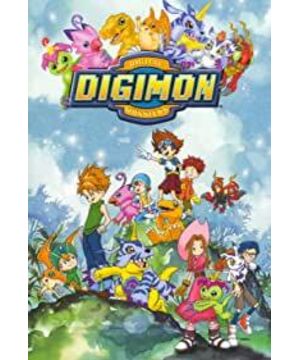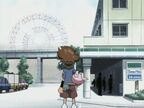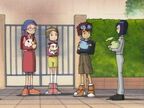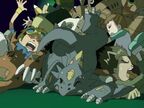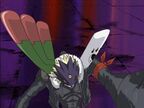"Digimon", a childhood classic of countless people, does not need to be introduced too much, especially the first one is not only the feelings and memories of the past in my opinion, but its own artistic level is also outstanding in similar animation works, even if it is released To this day, it will still be a wonderful work that I am most willing to recommend to my children. Let’s not talk about the whole work today, maybe many people still remember the 21st episode of the “different style of painting” - "Ball Monster in Tokyo". This episode is as exquisite as the theater version. The production is impressive. In fact, this episode does not deviate from the rhythm and setting narrative of the whole story, but the strong personal style and intentional atmosphere created by Director Hatada Mori has achieved a unique viewing experience, which makes many viewers feel that this is the only one. One episode is still fresh in my memory.
bocce in tokyo
The plot before this was that the chosen children finally defeated the second boss, the orangutan, relying on the first super-evolution of the Agumon. At this time, the children have obtained badges that symbolize their own character, and the super-evolution of their partner Digimon needs the support of the corresponding badges. This is a signal of the deepening of the plot. The battle is no longer solved by simply shouting slogans and evolving and transforming. In the face of stronger enemies, the protagonists must show the courage, love, knowledge, and friendship represented by their badges.. .... these powers can make your Digimon achieve a higher evolution beyond yourself. Taichi showed the power of courage when rescuing Su Na, so Agumon was the first to successfully evolve and defeat the Gorilla beast, but the two were also sucked away by the twisted time and space and separated from their companions.
When he opened his eyes again, Taichi and Gokumon had returned to Tokyo.
At this time, the background music is Ravel's classic Bolero , and it runs through it all the time. Suddenly leaving the main stage of the story in the previous dozens of episodes - the bizarre fantasy world, the streets of Tokyo in the hot summer are slowly presented in front of the audience with gentle and strange music. The picture above is TV Tokyo in the animation. Comparing the real scene in the picture below, it can be found that it is basically the same. The author uses a completely realistic style to deliberately show the real Tokyo, pulling the audience back to the real environment at once.
Taichi returns home uneasy, worried that he will not be able to explain to his family that he has been missing for so long, only to find that the time on the calendar has not changed. It was still the day they set off for the summer camp, where they had gone through months of adventures, but in the real world they had not passed even a single day.
And her younger sister, Kaer, who has never been to the Digimon world, is no stranger to Boommon. This sentence makes the friends who see it for the first time a little horrified. Why is this little loli in the real world not surprised when she sees Digimon, and she actually knows the ball beast? In fact, here is the plot and the content of the theatrical version also directed by Hatada Mamoru. In fact, the selected children have seen the Digimon with their own eyes when they were younger, and the Roller Beast also came to too much. in a family. Jia'er still remembered this, so he was one of them, but Taiyi himself had already blurred this memory and sealed it into a subconscious dream.
Taichi couldn't answer his sister's simple question. A few short clips and actions are enough to portray Taiyi's image of a good brother. He loves and cares about his sister very much, and also lays the groundwork for the subsequent separation.
He tried to contact the other companions, only to find that they didn't come back together. Taichi was confused by the status quo at first, and he did indeed return to Tokyo, but the boulder beast beside him and the digital machine in his hand reminded him that his previous experience was by no means illusory. If this is a dream, he can't tell whether his end is in reality or a dream.
However, as the protagonist of a natural optimism, Taichi quickly accepted this fact. He no longer thought about it, but turned on the air conditioner comfortably, and lay on the bed to enjoy the long-lost comfort. It didn't take long, however, for television news to report various disasters. And the culprits looming in the various shots in the real world—are actually Digimon.
This situation made Tai start to be alarmed. Obviously, he not only failed to escape the battle in that world, but let the battlefield spread to the real world.
So Taichi's heart began to shake, maybe the companions over there were going through hard battles, and it turned out that the significance of these battles no longer existed in the digital homeland, but would threaten the real world.
At this time, I accidentally received a call from my mother, and Taichi, who finally heard the voice of his relatives, almost collapsed with emotion. He hung up the phone in a panic, unable to avoid thinking about the status quo and the situation. Apparently he was shaken, and this idea is very true for a schoolboy. The sightseeing tour-style adventure has ended, and I have realized the danger and cruelty of that world. On one side is a home protected by parents, and a real society where adults cannot detect the existence of Digimon. On the other side is the unknown challenge, and he knows that if there is an accident there, he will die in the real world and never come back.
But in the end, the roar outside the window interrupted his thinking. When he saw that the Digimon really appeared in front of him and began to destroy the city, Taichi finally no longer hesitated, and decisively rushed out of the house holding the Boom beast. In the most familiar battle, he finally regained his composure and confidence. In the end, a portal appeared in the sky, and the Rollerbeast and other Digimon were attracted to the sky. Taichi finally knew that his mission was not over yet. Although he was behind the pitiful plea of his beloved sister, he still chose to move forward. Just this time, it is no longer for a novel adventure, but to protect everything that you cherish.
In the later episodes, Taichi, who returned to the Digimon world, began to search for his lost companions one by one. The other children also exercised the character and strength of their representatives in various events, and when they finally reunited again, Taiyi was officially elected as the captain and leader by the children. The plot has also moved to a new height. Their experiences are no longer daily adventures in the fantasy world, but actively lead to more powerful enemies and more terrifying threats, truly fighting for the safety of the two worlds. .
The turning point in the entire theme of "Digimon" from ignorance to growth is this episode. One of the most interesting easter eggs is that the broadcast time of this episode is August 1, 1999 in the play. This is the day the chosen children travel to the world of Digimon at the summer camp, the day Taichi returns to Tokyo, and the summer that all the viewers in front of the TV are experiencing. Such an intentional and rare coincidence gave the audience a mysterious sense of synchronicity. The world of Digimon, the real world in the animation, and the real world in which the audience was located, the three seemed to overlap on that day. All of a sudden from that magnificent and strange world back to reality, floating life is like a dream, both real and fantasy. It seems that you just took a nap in the drowsy summer, and you wake up to find that your face is flushed, and the fine sweat and the noisy cicadas remind you of the reality of the hot and humid outside the window.
The Bolero as the background music is a well-chosen and very distinctive work - the rhythm is the same from beginning to end, the tempo is always the same, and the theme and the answer are repeated and not expanded. The whole piece is always in the key of C major, only the last two bars begin to transpose, and there are only crescendo changes from beginning to end, until the end reaches a climax. Different from the cheerful rhythm of the previous young age, this episode presents a strange atmosphere change against the background of classic classical music, and the tone of the story begins to change. The plot is also like the music, the reality and the fantasy are constantly intertwined, and finally the gap between the Digimon world representing children's fantasy and the real heatstroke in Tokyo is broken.
When Taiyi returns, he will find that, like watching chess, a long time has passed in the Digimon world, and every other child has experienced an unforgettable challenge and experience. For Taiyi, the short day of August 1st is his own growth. Everyone will have their own experience of stepping down Alice's rabbit hole in childhood. This is the most ignorant memory and the earliest enlightenment of growth. Taichi's trip to Tokyo turns into a rabbit hole in the Digimon World Tour, a children's adventure. There are wonderful and sinister sides on both sides, and this time it is no longer passively involved, but actively selected. Because he has clearly recognized what his heart wants, what wonderful things he wants to pursue, and what responsibilities he should take.
Infinitely big dream no あとの もない世の中じゃ Travel through the ruthless world behind the infinitely extending dream
Digimon is a story about growing up. In this episode, which is halfway through the adventure fairy tale, the rhythm and style of this episode are intentional, and the rhythm and style of this episode are intentional - this is the transition from chaotic and ignorant childhood memories to the lush youthful years. From being accidentally involved to taking the initiative to decide to go back, from passively facing the surrounding environment and being driven by accidents; to actively exploring the world, chasing dreams and fighting for it - the only change in this is that Taiyi has learned to do Make choices, and this is the biggest sign of growth
View more about Digimon: Digital Monsters reviews


